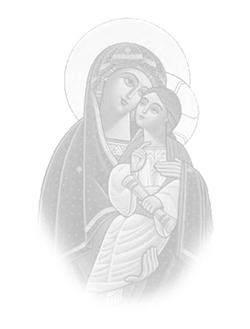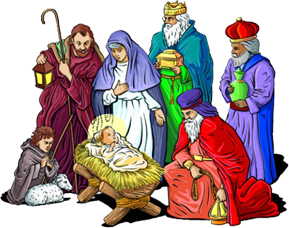God said that these days belong to Him. "You shall not do any work...They are days of Holy Convocation" (Leviticus23 :3). The Scriptures say: "Then God blessed the seventh day" (Genesis2 :3). God gave these days special importance although all days are for Him, and all life is for Him.
In order that it may not be understood by some people that this is the law of the Old Testament, Saint John the apostle said "I was in the Spirit on the Lord's day." (Revelations1 :10)
Although he was an apostle and all his life was consecrated and devoted to God, yet he talked about the "day for the Lord";
a day which had special sacredness, on which the gates of Heaven were opened and on which he saw the Throne of God, the angels and groups of the Heavenly Hosts.
The times of the life of man are not all of the same standard. There are days which have special sanctity. There is no doubt that the day on which God appeared to Paul of Tarsus on the way to Damascus, and talked to him, reprimanded him. and chose him, was a holy day which had a special stamp on the life of the saint. There is also no doubt that the times at which he climbed up to the third Heaven, and saw things that cannot be talked about, were extraordinary times, which had special sanctity.
As it is in the life of the individual so is it in the life of the whole Church. The day on which God granted us His body, His blood and said "Do this in remembrance of Me" is a sacred day, different from the rest of the days.
The day on which the Lord was crucified for our sake and redeemed the whole world is a sacred day that is distinguished from all the other days.
Indeed, we always mention salvation and redemption, but the sixth hour has special sanctity each day. Friday of each week also has special sanctity. The passion week of each year has special sanctity and reminiscences; they truly are holy times.
God gave us different kinds of holy days, among which there are days for joy, such as the feasts, and days of humiliation before Him. All are holy days. For the sake of God we rejoice, and for His sake we are humiliated. All those feelings are holy.
The days of fasting are holy because in them there is self-control and the supremacy of the spirit over the body.
They are times of prayer, worship and closeness to God. This is why we are sanctified with all that.
The days of penitence are holy times in the eyes of God because they are times of reconciliation with Him. In their tears and gloominess they are holy days before God, like the days of feasts in their joy and praise.
The times of prayer are also sacred because in them, there is a special relation with God. Prayer sanctifies time. As the time is sanctified by individual prayer, so is it also sanctified in group prayer.
If there are certain times necessitated by organization or divine disposition for the meeting of all people for worship or meditation, these times are also assigned as holy times. We say this in spite of the fact that the whole life of man is consecrated for God, but that there are various grades of holiness. If sin is committed by any person at a sacred time or in a sacred place, it will be more dreadful and more defiled.
The sin of the sons of Eli the priest was more atrocious before God, and it deserved an equally severe punishment because it was committed in a holy place. Although sin is ugly wherever it is committed, yet the committing of the sin in a holy place indicates, in addition to sin, a contempt of the sanctity of the place. It is also a proof of the cruelty of the heart and makes the sinner liable for more severe punishment.
To commit sin during the period of fasting is more awful than on an ordinary day, because it indicates disrespect of fasting and its sanctity. It also indicates that the sinner does not benefit from the spirituality of fasting. In this respect, it is a complex wrong act that includes a group of mistakes.
In the same way, sin which is committed after partaking from the Holy Communion or on the same day, indicates disdain of Communion.
It is assumed that holy days have special influence that elevates man.
If a man is not elevated, or if he does not remain in his position, but goes downwards with sin, this indicates greater ugliness in disrespect of the sanctity of the holy days and their influence.
The attention paid by the Church to certain days like the sacred forty days of the Great Lent, caused it to make preparations for this holy period by assigning another week of fasting during which a person gives himself training so that he may enter into the forty holy days with a ready heart.
You may ask yourselves: 'What kind of fasting do we keep?'
There are some people who fast because of a certain problem. Their fasting will have its efficacy in heaven and earth. What then would be the effect of the fasting of thousands or millions of people, all at the same time?
What is important is that people should fast with the spiritual means that are suitable for fasting. I like the statement of Joel, the prophet: "Consecrate a fast," that is to say, that it is not an ordinary fast. It is not merely abstinence from food, but it is a spiritual, holy fast that has its effect before God and man.
This fast is sanctified by the prayers that are offered, the readiness of the heart, by being in the presence of God and because of penitence. Fasting without penitence is not a holy fast. The element of penitence in fasting is more important than the abstinence from food. The times of penitence, even without fasting, are sacred times. They are times of joy on the part of God and His angels in Heaven. The Scripture says "that there is great rejoicing in Heaven when one sinner repents." How would it be then if there was penitence for all the people, accompanied by fasting and prayer?
The times of service are also holy times, because in them, the kingdom of God is built up and many souls are drawn from afar to dwell in it.
You can make fasting holy by all spiritual acts. Train yourself for the sanctity of life in these holy days, so that this sanctity may become a permanent program in your life. A person who trains himself to let his times be holy, will feel the value of time in his life. He will not permit himself at all to waste his time in trifling, useless things.
Every minute in his life has its value; how then would be the hour and the day? A spiritual person once said 'All the people who are in hell desire one minute of life so as to offer penitence in it and divert all the course of their life and fate. ,
You have all this long life, this great treasure, not only of minutes but of hours and days. Do you appreciate the value of every hour? And do you do something equal to its value, or is your life lost?
Do not let your times pass, being barren, and not giving birth to something spiritual. Do not let your time be cheap in your eyes; do not squander it extravagantly in what does not benefit you or others.
If you have squandered your time in the past, you can now save what is remaining of your life.















 Subscribe to RSS Feed
Subscribe to RSS Feed